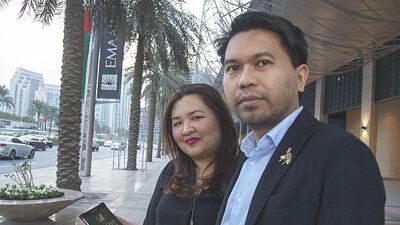DUBAI // A money management app for Filipino workers in the Middle East and African countries will make its debut at a regional summit for expats this month.
The Wealthy Filipino Migrants app will be uploaded at the launch on February 27 at Desert Palm Hotel in Dubai with the special digital edition of The Essential OFW Guide to UAE.
The app is aimed at helping workers to put their wages to good use.
Like many expatriates, Angel Perito, a 40-year-old mother of three children, remits a portion of her monthly salary to cover her children’s living costs in the Philippines.
Ms Perito, who works at an oil and gas company in Dubai, wants to avoid the debt trap and return home after building up her savings.
“I just give them what I can afford,” said Ms Perito, who arrived in Dubai last March.
“I always tell them that the cost of living here is high and that they won’t always get what they want.
“I have an online shop business back home since my family can’t rely mainly on remittances.
“My goal is not to be really wealthy but for me and my family to live comfortably in the Philippines.”
Barney Almazar, a Filipino lawyer who is behind the app project in Dubai, said its target users were mainly new Filipino migrants. But he said he hoped the app would also provide guidance to people who are debt-laden and cash-strapped even after working abroad for a decade.
Last year, Mr Almazar wrote a book, The Essential OFW Guide to the UAE with Grace Princesa, the former Philippine ambassador to the UAE. OFW stands for overseas Filipino workers.
It featured information on local laws, UAE Central Bank rules on loans, job contracts and basic labour rights.
“When we did the guidebook which heavily focused on laws, it also highlighted the number one problem among overseas Filipino workers – indebtedness,” said Mr Almazar.
“It was the first step so they won’t face any debt problems. But in hindsight, I felt being aware of the local laws wasn’t enough.”
The app, which doubles as an e-book, offers practical advice on how Filipino migrants could better manage their money. It is available to iPhone and Android users.
“We hope to address the problem of indebtedness and teach them how to become financially independent,” said Mr Almazar, who started working on the project last August.
It begins with a six-year plan and a summary of goals, followed by “mirror budgeting” which involves migrants and their families back home, tracking expenses and analysing spending patterns.
“Filipino billionaires will be the ones to offer tips,” said Mr Almazar, who is also the corporate secretary of the Philippine Business Council in the UAE.
“Users will also learn about the ‘how to get rich fast’ myths, and they will have access to personalised worksheets and automatic reminders to keep them on the right track.”
Ms Perito said people could achieve financial freedom if they put their mind to it. “If they’re confident and strive to make it better out here, there’s no stopping them from being wealthy,” she said.
Essentially, it was about developing good personal finance habits and making the right choices, said Mr Almazar.
“You’re in control of your finances. That’s your income. But if you go on a spending spree, you’ll lose the opportunity to save and live comfortably,” he said.
rruiz@thenational.ae

